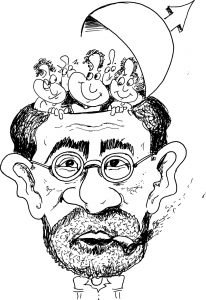sexology

Sexology is a good example of the way science is intermingled with ambitions and shortcomings of people and society. A sexologist is a professional, usually a psychologist, physician or social worker, who is (accepted as) qualified to help people solve sexual problems, such as erectile or orgasmic dysfunction, pain or aversion during coitus, ejaculatory incompetence, etc.
Over the last half-century or so, they have set up associations, which promote research, publish journals, regulate the quality of training and services rendered to the public, set up standards of conduct, strive for recognition, organize conferences, etc. There are handbooks, guidelines for the professionals, publications about specific topics, conventions, all kinds of research. In short, sexology seems to be a respectable and fully-fledged branch of science.
Who practices sexology?
On closer looks, this picture needs correction. The certified professionals in the field of sexology are not really ‘sexuologists’, but primarily psychologists, social workers or physicians. Their knowledge about sex is a kind of added value. They have, for instance, researched a sexual ‘dysfunction’ such as premature ejaculation, or they may be gynaecologists who take a special interest in problems of the female genital tract. Psychologists are drawn to the study of sex because in their practice they meet with a great deal of male-female and parent-child conflict, as well as sexual dysfunctions, paraphilia and sexual delinquency.
Thus, sexology is mainly concerned with the provision of first-line help to couples with sexual problems (which mostly turn out to be relational ones), and with the treatment of sexual abnormality or crime. It is not a discipline with its own curriculum at universities, let alone an independent scientific ‘paradigm’ of knowledge such as physics of biology.
Sexology and sexual dysfunctions
The cause of the limited significance of sexology can be found in society. Strong emotions about the subject of sexuality exist in society and the academic community is no exception. Sexology has found a modest place under the umbrella of gynaecology, by limiting itself to sexual dysfunctions of married couples. Compared with the past and with some other countries, the western world has made some progress in the enlightenment and training of doctors, psychologists, health professionals, who are now said to pay more attention to sexual aspects of their patients’ situation than they used to. But a significant and fundamental shortcoming remains. Because sexology has to limit itself to medical and psychological help and therapy, the wider sexual system itself remains undiscussed. Indeed, the sexual system is supported and reinforced, not criticized or studied, by most sexologists.
Sexology and perversions
This is illustrated by the role which sexology plays in cases of deviation, aberration, perversion, nowadays called ‘paraphilia’. Behaviour that does not fit within the marriage-and-reproduction model has always been under suspicion. Sexology has, from its beginnings in the 19th century, played a role in the treatment and prevention of ‘abnormalities’. That was progress compared with the cruel punishments that were dealt to sex offenders in earlier days. But no sexologist can possibly be proud of their treatment, in the past, of masturbators (called ‘self-abusers’), gays and lesbians and so-called frigid women and nymphomaniacs.
Something comparable is happening at the present time. The sexual delinquents of today, just like those of yesterday, detested generally, are the ‘rapists’ and ‘child abusers’. Some (not the worst) sexologists have been given or have taken upon themselves the task of treating, or at least helping these people. In this capacity they may function as a humane buffer against possibly cruel punishments or lynchings, yet at the same time they are compelled to subscribe to the underlying collective disapproval. However understandable, this makes them part of the problem, not the solution. If sexology were based on a wider scientific theory of sex, the social and psychological forces at work in the etiology and treatment of paraphilia might be better understood and treated.
Medical science is biassed towards treatment of dysfunction and aberration, and this has influenced the treatment and prevention of sexual problems of married people. By researching sexual behaviour within a laboratory setting, the scientific quality and status of sexology have increased, but its scope has been limited. The selection of subjects and problems has automatically led to the practice of helping married couples. This supports the prevailing view that sex has its proper place within marriage or a permanent relationship of two heterosexual adults.
Sexology and medicine
Another typical aspect of medical science is prescription of medicine. Only physicians are authorized to prescribe drugs, to relieve, for instance, ‘impotence’ in a male patient or ‘orgasmic dysfunction’ in a female. The physician-sexologist thus participates in a worldwide market for the promotion of the happy marriage, even if the cause of the sexual complaint is the marriage institution itself. Men are given pills to help them overcome erectile dysfunction with their spouses, even though they have no erection problem masturbating or with another partner. Women are prescribed pills to increase their desire for their spouse, when they might well be motivated to have sex with someone else.
Because of the power of the medical establishment to define human problems as ‘health’ problems, sexology as it is practised narrows the scope of what could be a true scientific theory of sex.
From the start, sexologists have sought the cause of sexual and other problems in ‘unhealthy’ sexual experiences during childhood or adolescence. Masturbation (‘self abuse’) was blamed for many afflictions, just as nowadays ‘child abuse‘ is seen as a major cause of troubled or deviant behaviour. Sexology has moral opinions about ‘healthy’ sex and spreads them through the media and sex education for the young. As the status and influence of sexology has grown, the scope of information has shrunk. Formal sex education nowadays concentrates mainly on dangers and risks. Sexology is not the cause of this, but is has made its contribution by not being enough.
